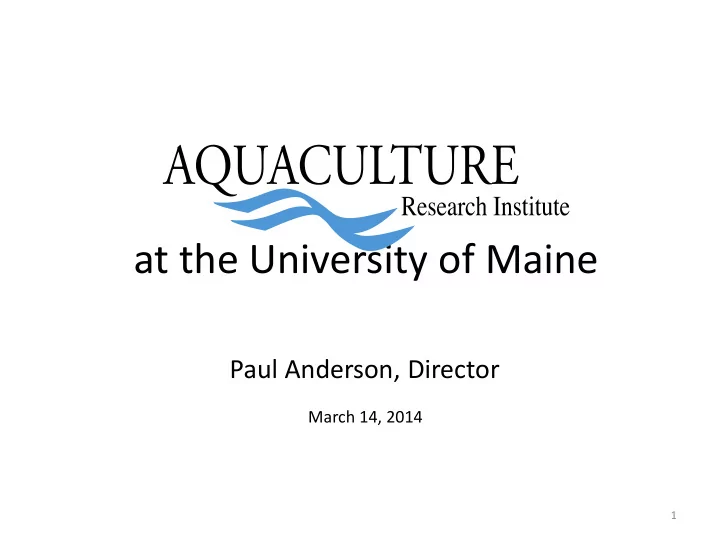

at the University of Maine Paul Anderson, Director March 14, 2014 1
ARI’S VISION Aquaculture in Maine will grow in size, become more diverse, and will be consumer responsive, welfare conscious, environmentally sustainable, and globally competitive 2
ARI’S MISSION To conduct RESPECTED, RELEVANT, and RESPONSIVE research targeted at improving the efficiency, profitability, and sustainability of existing and emerging aquaculture in Maine and the nation, creating jobs and increased economic activity, yet conserving and protecting our natural resources and environment. The Institute will conduct research in areas of concern to industry and the public, whilst providing the leadership for new research, ideas, concepts, ventures and policy issues. 3
Aquaculture Research Institute • Multi-disciplinary • Multi-departmental • Core faculty funded by Institute • World class facilities – Commercial scale – Small research projects – Shellfish – Business incubators 4
Center for Cooperative Aquaculture Research 5
FISHLab Floor Plan 6
Artist rendering 7
Aquaculture Research Center, Orono • Interpretation center • Small scale research facilities • Innovation center/ student-led business 8
Darling Marine Center, Walpole • Predominantly shellfish • Research shellfish hatchery • Microalgae • Business Incubator 9
Core Competencies • Sustainable Aqua • Translational Aqua – IMTA – New species development – Breeding programs – Diagnostics – Species diversification – Vaccines Experience with huge range of fish and shellfish species, and some sea vegetables 10
RESEARCH • Sustainable Aquaculture – Environmental, social & economic sustainability • Interdisciplinary Animal & Veterinary Sciences; Anthropology; Aquarium Sciences; Bioproduct Research; Business; Chemical and Physical Oceanography; Civil & Environmental Engineering; Climate Change; Communication; Community Engagement; Computing & Information Science; Earth Sciences; Environmental & Biological Sciences; Food Science; Genomics; Marine Biology & Ecology; Marine Engineering; Marine Science; Marine Spatial Planning; Mathematics & Statistics; Mechanical Engineering; Molecular & Biomedical Sciences; Native American Research; Nutrition; Oceanography; Plant, Soil & Environmental Sciences; Policy & Law; Political Science; Production & Resource Economics; Production Technology; Renewable Energy; Spatial Information Science; Water Resources; Wildlife Ecology 11
Developing Scallop Farming • Maine Sea Grant • 2 undergraduate student projects 12
Next Generation • New Leadership at UMaine • External Review (May, 2014) • EPSCoR Proposal on Ecological Aquaculture in partnership with UNE and others • 5 year strategic plan • Increase capacity for interdisciplinary research and education in Maine 13
Recommend
More recommend